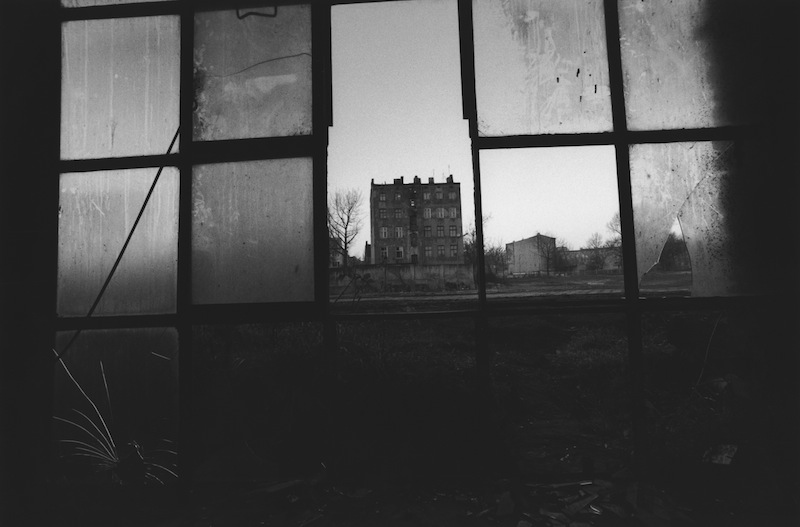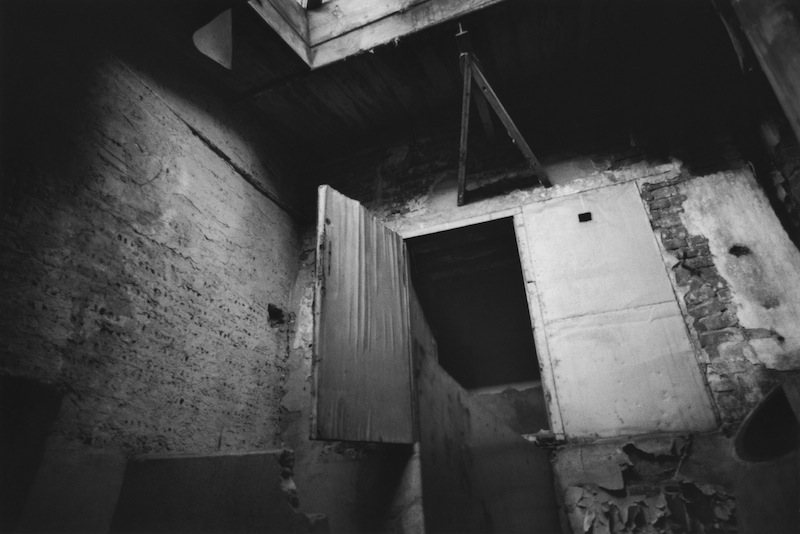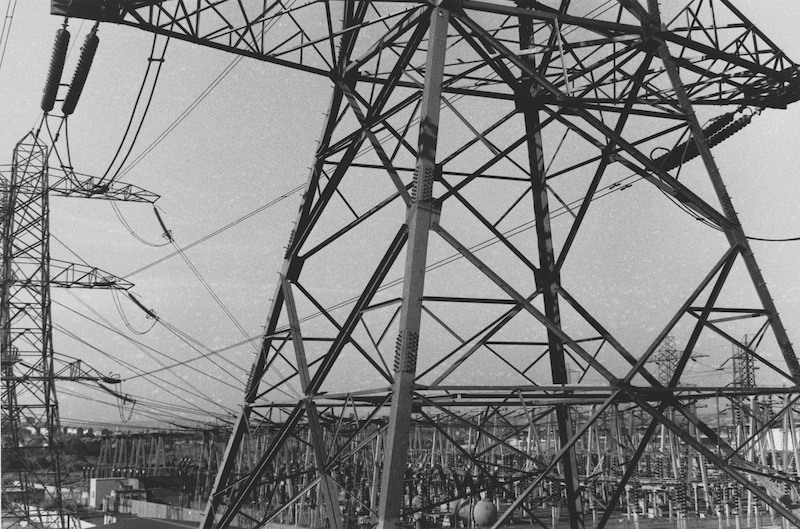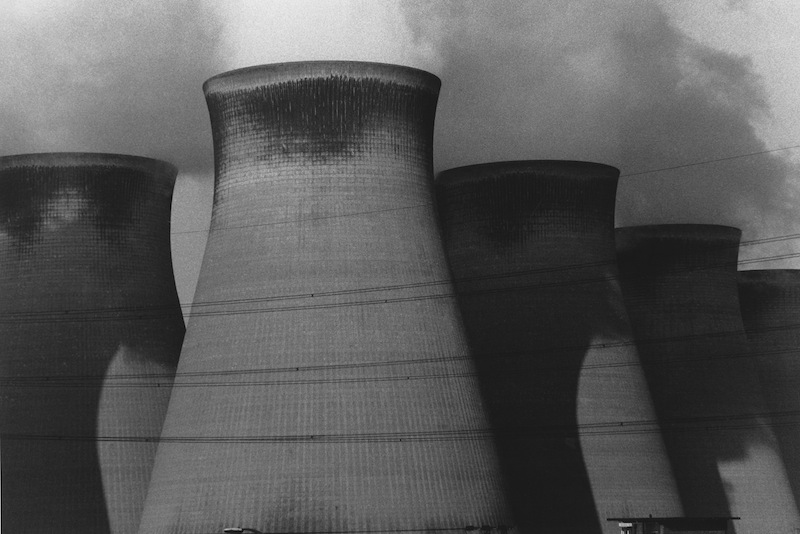LONDRA. Fino al 30 marzo alla The Photographers’ Gallery sarà in mostra “The Factory Photographs” con fotografie di David Lynch. Una serie di scatti in bianco e nero relativi a fabbriche abbandonate tedesche, inglesi, newyorkesi e polacche in cui Lynch evidenzia il lato cupo, catturandone passaggi labirintici e detriti e, più complessivamente, il loro decadimento. Quelle che una volta erano fabbriche attive, oggi sono solo cattedrali di un’epoca industriale passata, succubi della natura.

Untitled (Łódź), 2000
Archival gelatin-silver print
11 x 14 inches
All photographs in an edition of 11 © Collection of the artist
Il tema di industrializzazione, del resto, è di grande interesse per Lynch e nei suoi scatti riecheggiano immagini già viste in film come Eraserhead (1977), The Elephant Man (1980) e Dune (1984) dove macchinari e suoni dell’industria dominano lo sfondo. Disintegrate e fatiscenti, le fabbriche abbandonate appaiono a Lynch come un rifugio dall’impeto del progresso e della tecnologia moderna. E lui le ritrae come fossero realtà surreali, spazi ultraterreni e simbolici che ricordano i caratteri inquietanti ed enigmatici dei suoi film; evidenziando i tratti malinconici e la desolazione derivante dall’assenza di persone. I rami nudi degli alberi, le fessure delle finestre e la vernice scrostata muro evocano, poi, i disegni a carboncino.

Untitled (Łódź), 2000
Archival gelatin-silver print
11 x 14 inches
All photographs in an edition of 11 © Collection of the artist
In mostra, per “The Factory Photographs”, oltre ottanta immagini scattate tra il 1980 e il 2000. Stampate su carta di gelatina/argento, la consistenza delle stampe assomiglia alla fuliggine, vapori e polveri sottili che ricoprono le superfici dipinte. La mostra è divisa per aree tematiche: dalle fotografie architettoniche degli edifici agli interni, da vecchie macchine a dettagli di metallo, tubi e tralicci. La mostra termina con le fotografie esterne delle fabbriche e dei loro dintorni. La mostra è curata da Petra Giloy – Hirtz.

Untitled (England), late 1980’s/early 1990s Archival gelatin-silver print
11 x 14 inches
All photographs in an edition of 11
© Collection of the artist
English version. The Photographers’ Gallery presents the European debut of David Lynch’s The Factory Photographs. In this series Lynch extends his unique cinematic style to dark and brooding images of derelict factories. The photographs are all shot in black and white in locations including Germany, Poland, New York and England. They capture the labyrinthine passages, detritus and decay of what are now, haunting cathedrals of a bygone industrial era, slowly overtaken by nature’s innate power. The exhibition also features sound works created by the artist. The theme of industrialisation is of great interest to Lynch and in films such as Eraserhead (1977), The Elephant Man (1980) and Dune (1984) machinery and the sounds of industry dominate the background. He began taking photographs of factories when scouting for shooting locations and many of his images seem to possess an inherent potential for being the setting of a story. Functionless, disintegrating, rundown, the ‘factory’ appears in Lynch’s ‘personal narrative’ as an enclave, a refuge from the onrush of progress and modern technology.

Untitled (England), late 1980’s/early 1990s Archival gelatin-silver print
11 x 14 inches
All photographs in an edition of 11
© Collection of the artist
These photographs exude David Lynch’s sense of aesthetics and reveal his unmistakable signature: surreal imagery enticing viewers into a world of memory and thought. The otherworldly spaces, cypher-like symbols and strange metamorphoses are reminiscent of the enigmatic and ominous qualities of his films. The factories are always set against the backdrop of winter; adding to their sense of melancholy and desolation is the absence of people whose presence is nonetheless evident throughout. The naked branches of trees, cracks in the windows and peeling wall paint evoke the painterly qualities of charcoal drawings. The Factory Photographs present over eighty images taken between 1980 and 2000, all sized at 27.9 x 35.6 cm and displayed in a classic matte and dark wooden frame.
Printed on gelatin-silver paper, the texture of the prints resembles the soot, vapours and fine dust covering the surfaces depicted. Arranged in a thematic hang, the exhibition will take viewers on a visual tour of the factories. Starting with architectural photographs of the buildings, it continues with interior shots, focusing on details such as the old machinery, metalwork, pipes and wires. The exhibition comes full circle ending with exterior photographs of the factories and their surroundings. The exhibition is curated by Dr Petra Giloy-Hirtz, a curator and author based in Munich.

Portrait of David Lynch
David Lynch said: I just like going into strange worlds. A lot more happens when you open yourself up to the work and let yourself act and react to it. Every work ‘talks’ to you, and if you listen to it, it will take you places you never dreamed of.

